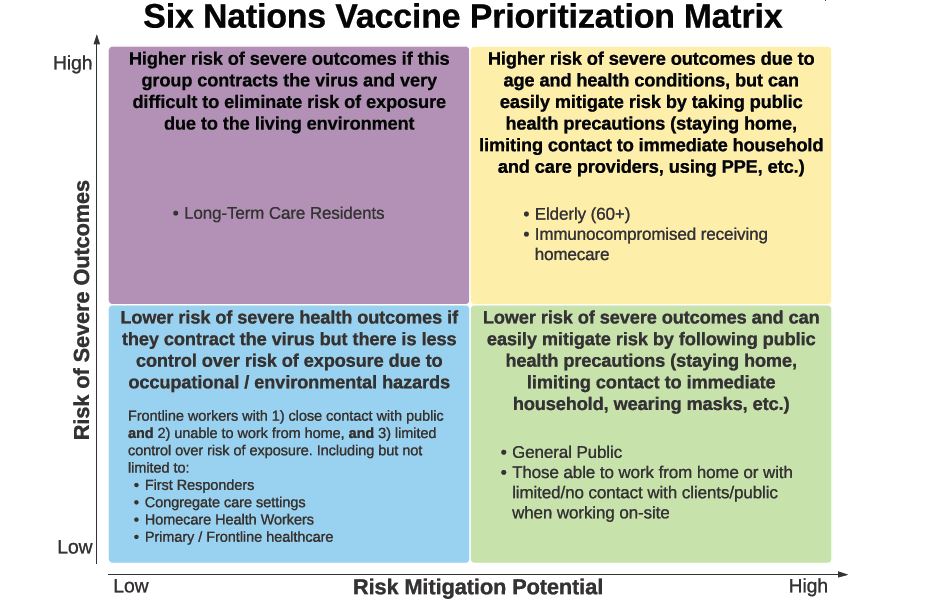
A Covid-19 vaccine shortage in Canada means only Six Nations’ vulnerable and at-risk populations are getting inoculated against the virus until more doses become available for the general population.
Six Nations of the Grand River Elected Council approved a vaccine prioritization matrix last week, developed by Six Nations Health Services, which lays out who should get the vaccine on the territory, and when, as the country deals with a limited supply of the vaccine.
Residents of care facilities remain the highest priority at this time, council heard during a special virtual meeting last week.
As of press time, about 70 per cent of staff at Iroquois Lodge long-term care home were vaccinated against Covid-19, while over 80 per cent of residents have been vaccinated.
Vaccinations were expected to be complete for residents at the Jay Silverheels complex by the end of this week.
In the meantime, Health Services has created an online registration database for anyone wishing to get the vaccine as soon as the supply becomes available.
It’s not yet known when the vaccine will be available for the general population, said Zach Miller, administrative director at Health Services.
“Once we have a more steady flow of vaccines coming in to the community and a consistent flow, we’ll switch that pre-registration system to a booking system so that people are aware of when they’ll be booked,” he said. “At this point because of the low amount of vaccines coming in to the community, it’s simply a registration system. Those on the (list) will be contacted once the vaccine becomes available.”
Besides elders, frontline workers such as health services staff, paramedics and other first responders are high on the priority list.
Community members tuned in for the virtual information session, with some wondering why masks and physical distancing will still be needed even after the vaccine has been administered to the majority of the population.
Miller said the vaccine doesn’t prevent the spread of Covid, but is intended to reduce severe symptoms in those exposed to the virus.
“It’s not meant to slow the transmission. Even after you receive the vaccine, you still have to take public health precautions until notified otherwise. Really the focus is that you don’t have a severe outcome. This is similar to what we already have with the flu vaccines. That’s going to be an emphasis in our communications strategy.”
Zach Miller, Lacey VanEvery, acting nurse in charge at Gane Yohs Health Centre, said the research is still on-going into how the vaccine can limit the spread of Covid. In the meantime, physical distancing will still be required in the community.
“It’s going to take some time before we can start lifting those precautions. We still have a ways to go in this pandemic. We’re dealing with a limited supply nationwide right now. There will come a time when more vaccine is available. I can’t answer how quickly but we are working diligently – once we get that flood of vaccine, we’re good to go. (prepared).”
Vaccines will be administered via individual appointments, she said.
Elected Chief Mark Hill reiterated that the vaccine will not be mandatory for any Six Nations person or employee.
“It comes down to personal choice. It’s not mandatory.”
Northern Ontario First Nations have already received the Covid vaccine for all their residents, council heard. The province prioritized them as a high-risk group and made that decision, said Coun. Nathan Wright.
The Covid vaccine is not approved for children.






